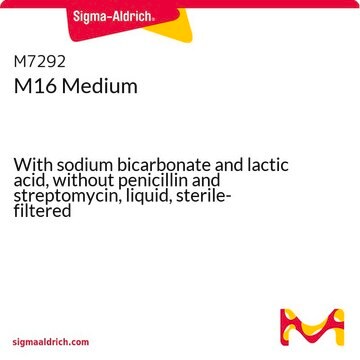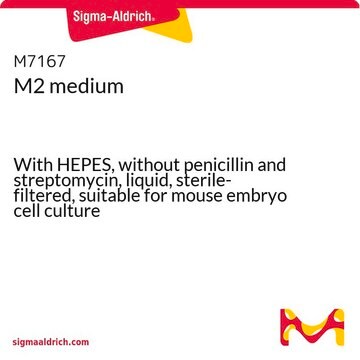W1503
Water
sterile filtered, suitable for embryo cell culture, BioXtra
About This Item
Recommended Products
product name
Water, for embryo transfer, sterile-filtered, BioXtra, suitable for mouse embryo cell culture
vapor density
<1 (vs air)
vapor pressure
3 mmHg
sterility
sterile-filtered
product line
BioXtra
form
liquid
technique(s)
cell culture | embryo: suitable
impurities
endotoxin, tested
refractive index
n20/D 1.34 (lit.)
pH
5-7
bp
100 °C (lit.)
mp
0 °C (lit.)
density
1.000 g/mL at 3.98 °C (lit.)
SMILES string
O
InChI
1S/H2O/h1H2
InChI key
XLYOFNOQVPJJNP-UHFFFAOYSA-N
Looking for similar products? Visit Product Comparison Guide
Application
Water has been used:
- in toxicological analyses for the suspension of emission particles
- for suspension of particulate samples in various studies
- in cell cultivation and exposure
- for washing cells in calcium free water during the detection of intracellular calcium changes
Other Notes
related product
Storage Class Code
12 - Non Combustible Liquids
WGK
nwg
Flash Point(F)
Not applicable
Flash Point(C)
Not applicable
Personal Protective Equipment
Certificates of Analysis (COA)
Search for Certificates of Analysis (COA) by entering the products Lot/Batch Number. Lot and Batch Numbers can be found on a product’s label following the words ‘Lot’ or ‘Batch’.
Already Own This Product?
Find documentation for the products that you have recently purchased in the Document Library.
Customers Also Viewed
Our team of scientists has experience in all areas of research including Life Science, Material Science, Chemical Synthesis, Chromatography, Analytical and many others.
Contact Technical Service









